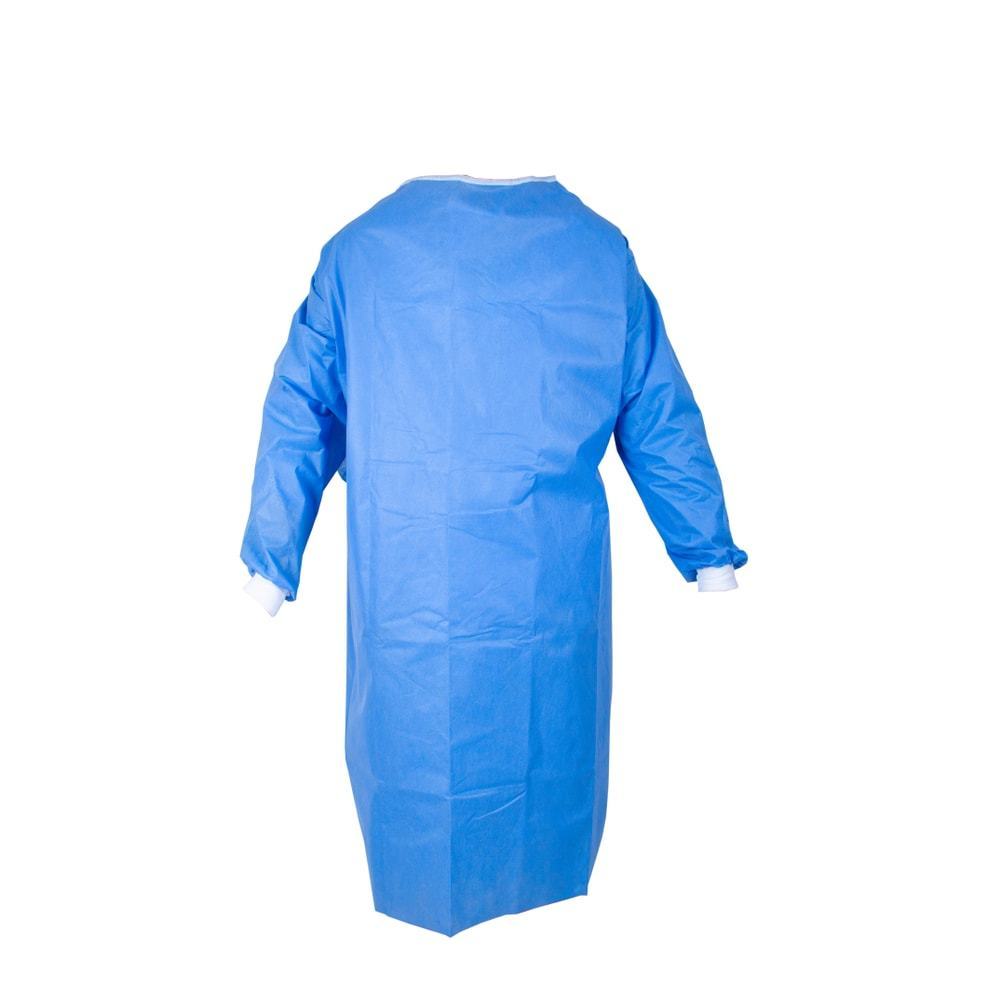Gowns & Aprons
Emergency Home Preparation :: Preparation Guidelines :: Medical Concerns :: Masks, Gloves and other Protective Gear
Page 1 of 1
 Gowns & Aprons
Gowns & Aprons
This is a large publication from the CDC. Scroll to the pages indicated for the aprons info:
Gowns & PlasticAprons:
https://www.who.int/csr/resources/publications/ebola/whoemcesr982sec1-4.pdf
(Page 47-49)
Gown or Outer Layer: Wear a disposable surgical gown or acotton gown over the first layer of clothes.
Plastic Aprons: Wear a plastic apron over the outer gown. Theapron prevents contact with infectious body fluids that may soakthrough protective clothing when thepatient bleeds, coughs or vomits.

Gowns & PlasticAprons:
https://www.who.int/csr/resources/publications/ebola/whoemcesr982sec1-4.pdf
(Page 47-49)
Gown or Outer Layer: Wear a disposable surgical gown or acotton gown over the first layer of clothes.
Plastic Aprons: Wear a plastic apron over the outer gown. Theapron prevents contact with infectious body fluids that may soakthrough protective clothing when thepatient bleeds, coughs or vomits.

Last edited by ReadyMom on Wed Feb 17, 2021 2:13 pm; edited 2 times in total (Reason for editing : Updated link)
_________________
Anything I post may NOT be used for commercial purposes or any type of 'For-Profit' distribution.


ReadyMom- Admin
- Posts : 7346
Join date : 2018-08-11
 Re: Gowns & Aprons
Re: Gowns & Aprons
From the same CDC publication. Scroll to the pages indicated for the Gowns info:
Gown or Outer Layer:
https://www.cdc.gov/vhf/abroad/pdf/african-healthcare-setting-vhf.pdf
Wear a disposable surgical gown or a cotton gown over the first layer of clothes.
Disposable surgical gowns can be reused by the same staff member if they are not contaminated and are not obviously dirty and torn.
When the supply of disposable gowns is limited, wear a cotton surgical gown that can be washed and reused.
The gown should:
• Open at the back and close with ties at the neck and waist.
•
Be knee-length with collar wraps around the neck and elastic bands to close the gown around the wrist. If elastic bands are not used, sew on cotton loops. They can be hooked around the thumb to hold the sleeve in place.

Gown or Outer Layer:
https://www.cdc.gov/vhf/abroad/pdf/african-healthcare-setting-vhf.pdf
Wear a disposable surgical gown or a cotton gown over the first layer of clothes.
Disposable surgical gowns can be reused by the same staff member if they are not contaminated and are not obviously dirty and torn.
When the supply of disposable gowns is limited, wear a cotton surgical gown that can be washed and reused.
The gown should:
• Open at the back and close with ties at the neck and waist.
•
Be knee-length with collar wraps around the neck and elastic bands to close the gown around the wrist. If elastic bands are not used, sew on cotton loops. They can be hooked around the thumb to hold the sleeve in place.

_________________
Anything I post may NOT be used for commercial purposes or any type of 'For-Profit' distribution.


ReadyMom- Admin
- Posts : 7346
Join date : 2018-08-11
 Re: Gowns & Aprons
Re: Gowns & Aprons
About medical gowns
https://www.fda.gov/MedicalDevices/ProductsandMedicalProcedures/GeneralHospitalDevicesandSupplies/PersonalProtectiveEquipment/ucm452775.htm
Gowns are examples of personal protective equipment used in health care settings. They are used to protect the wearer from the spread of infection or illness if the wearer comes in contact with potentially infectious liquid and solid material. They may also be used to help prevent the gown wearer from contaminating vulnerable patients, such as those with weakened immune systems. Gowns are one part of an infection-control strategy.
A few of the many terms that have been used to refer to gowns intended for use in health care settings, include surgical gowns, isolation gowns, surgical isolation gowns, nonsurgical gowns, procedural gowns, and operating room gowns.
In 2004, the FDA recognized the consensus standard American National Standards Institute/Association of the Advancement of Medical Instrumentation (ANSI/AAMI) PB70:2003, “Liquid barrier performance and classification of protective apparel and drapes intended for use in health care facilities.” New terminology in the standard describes the barrier protection levels of gowns and other protective apparel intended for use in health care facilities and specifies test methods and performance results necessary to verify and validate the newly defined levels of protection:
Including:
Gowns
Surgical Isolation Gowns
Non-Surgical Gowns
Standards for Gowns
Choosing Which Gown to Use
https://www.fda.gov/MedicalDevices/ProductsandMedicalProcedures/GeneralHospitalDevicesandSupplies/PersonalProtectiveEquipment/ucm452775.htm
Gowns are examples of personal protective equipment used in health care settings. They are used to protect the wearer from the spread of infection or illness if the wearer comes in contact with potentially infectious liquid and solid material. They may also be used to help prevent the gown wearer from contaminating vulnerable patients, such as those with weakened immune systems. Gowns are one part of an infection-control strategy.
A few of the many terms that have been used to refer to gowns intended for use in health care settings, include surgical gowns, isolation gowns, surgical isolation gowns, nonsurgical gowns, procedural gowns, and operating room gowns.
In 2004, the FDA recognized the consensus standard American National Standards Institute/Association of the Advancement of Medical Instrumentation (ANSI/AAMI) PB70:2003, “Liquid barrier performance and classification of protective apparel and drapes intended for use in health care facilities.” New terminology in the standard describes the barrier protection levels of gowns and other protective apparel intended for use in health care facilities and specifies test methods and performance results necessary to verify and validate the newly defined levels of protection:
- Level 1: Minimal risk, to be use used, for example, during basic care, standard isolation, cover gown for visitors, or in a standard medical unit
Level 2: Low risk, to be use used, for example, during blood draw, suturing, in the Intensive Care Unit (ICU), or a pathology lab
Level 3: Moderate risk, to be use used, for example, during arterial blood draw, inserting an Intravenous (IV) line, in the Emergency Room, or for trauma cases
Level 4: High risk, to be use used, for example, during long, fluid intense procedures, surgery, when pathogen resistance is needed or infectious diseases are suspected (non-airborne)
Including:
Gowns
Surgical Isolation Gowns
Non-Surgical Gowns
Standards for Gowns
Choosing Which Gown to Use
_________________
Anything I post may NOT be used for commercial purposes or any type of 'For-Profit' distribution.


ReadyMom- Admin
- Posts : 7346
Join date : 2018-08-11
 Re: Gowns & Aprons
Re: Gowns & Aprons
The Proper Fit for PPE
https://www.infectioncontroltoday.com/hand-hygiene/proper-fit-ppe
(Scroll down to the section on 'Gowns' ...)
There are two components to gowns, says Keith Kaye, MD, MPH, assistant professor in medicine, an infectious disease attending physician, and associate hospital epidemiologist for Duke University Medical Center in Durham, N.C. First is protecting yourself. In universal precautions, if you anticipate a splash of bloody fluid or even fecal or urinary incontinence, you wear a gown to protect your gear and your person from things like HIV and hepatitis C. The other side of things is protection of patients, and trying not to contaminate yourself with something like Clostridium difficile spores or Vancomycin-resistant Enterococci (VRE). ---CONTINUED---
https://www.infectioncontroltoday.com/hand-hygiene/proper-fit-ppe
(Scroll down to the section on 'Gowns' ...)
There are two components to gowns, says Keith Kaye, MD, MPH, assistant professor in medicine, an infectious disease attending physician, and associate hospital epidemiologist for Duke University Medical Center in Durham, N.C. First is protecting yourself. In universal precautions, if you anticipate a splash of bloody fluid or even fecal or urinary incontinence, you wear a gown to protect your gear and your person from things like HIV and hepatitis C. The other side of things is protection of patients, and trying not to contaminate yourself with something like Clostridium difficile spores or Vancomycin-resistant Enterococci (VRE). ---CONTINUED---
_________________
Anything I post may NOT be used for commercial purposes or any type of 'For-Profit' distribution.


ReadyMom- Admin
- Posts : 7346
Join date : 2018-08-11
 Re: Gowns & Aprons
Re: Gowns & Aprons
 Here are some sites that have patterns & instructions to make your own isolation gowns:
Here are some sites that have patterns & instructions to make your own isolation gowns: Peek-A-Boo
https://mosew.com/wp-content/uploads/2020/04/isolation_gown.pdf
This pattern is for an isolation style gown. A handmade gown will not provide the same protection as a commercial gown. Your choice of fabric will impact the level of protection provided. If you are sewing gowns to donate, contact the organization prior to starting your projectto verify the style needed and required type of fabric.
Thomasnet.com
https://www.thomasnet.com/articles/other/how-to-make-protective-gowns-for-coronavirus-covid-19/
According to the FDA, non-surgical gowns are exempt from pre-review and intended to protect wearers “from the transfer of micro-organisms and body fluids in low or minimal risk patient isolation situations.” It is important to note that gowns are really intended to stop blood-borne transmission, not an airborne transmission, the suspected path of the current coronavirus.
DIY PPE Medical Isolation Gown Pattern
https://www.uhsinc.com/wp-content/uploads/2020/04/DIY-Medical-Gown-Pattern.pdf
For Health Care Workers-PPE (Personal Protective Equipment)Washable and ReusableFor emergency use when approved gowns are unavailable.One Size*
_________________
Anything I post may NOT be used for commercial purposes or any type of 'For-Profit' distribution.


ReadyMom- Admin
- Posts : 7346
Join date : 2018-08-11
rick1 likes this post
 Re: Gowns & Aprons
Re: Gowns & Aprons
Your Guide to Isolation Gowns: Proper Use, Storage, and More
https://dmscoalition.com/blogs/blog/your-guide-to-isolation-gowns-proper-use-storage-and-more
 Reusable isolation gowns help healthcare professionals stretch much-needed personal protective equipment. They’re also an eco-friendly alternative to disposable gear. They lessen the impact on the environment.
Reusable isolation gowns help healthcare professionals stretch much-needed personal protective equipment. They’re also an eco-friendly alternative to disposable gear. They lessen the impact on the environment.
Reusable gowns reduce energy consumption. They also lower greenhouse emissions and solid waste.
Read on to learn how to use and store reusable isolation gowns and other vital facts. ---CONTINUED---
https://dmscoalition.com/blogs/blog/your-guide-to-isolation-gowns-proper-use-storage-and-more
 Reusable isolation gowns help healthcare professionals stretch much-needed personal protective equipment. They’re also an eco-friendly alternative to disposable gear. They lessen the impact on the environment.
Reusable isolation gowns help healthcare professionals stretch much-needed personal protective equipment. They’re also an eco-friendly alternative to disposable gear. They lessen the impact on the environment. Reusable gowns reduce energy consumption. They also lower greenhouse emissions and solid waste.
Read on to learn how to use and store reusable isolation gowns and other vital facts. ---CONTINUED---
_________________
Anything I post may NOT be used for commercial purposes or any type of 'For-Profit' distribution.


ReadyMom- Admin
- Posts : 7346
Join date : 2018-08-11
rick1 likes this post
 Re: Gowns & Aprons
Re: Gowns & Aprons
 Here's a last resort idea that I found in my files from the now-gone preparedness forum Pandemic Flu Information:
Here's a last resort idea that I found in my files from the now-gone preparedness forum Pandemic Flu Information:Originally posted by (Juliem) at pandemic Flu Information Forum

* Link Unavailable. This site is no longer active and available to view on line. But the info was good and we wanted to keep sharing it!
[snip] .... Thought about gowns, too. Hospital gowns are expensive, so I bought a ton of white t-shirts in XL and DH is not tossing out any of his old ones. We'll be able to use those for bedclothes for those of us who are sick, as well as caregivers being able to use them to cover their clothes when going in the room.
We're saving all plastic grocery sacks, to use for shoe covers when going in & out of the sick room. Will have a trash can just outside doorway to dispose of shoe covers, & toss in the T-shirts before washing.
_________________
Anything I post may NOT be used for commercial purposes or any type of 'For-Profit' distribution.


ReadyMom- Admin
- Posts : 7346
Join date : 2018-08-11
rick1 likes this post
Emergency Home Preparation :: Preparation Guidelines :: Medical Concerns :: Masks, Gloves and other Protective Gear
Page 1 of 1
Permissions in this forum:
You cannot reply to topics in this forum

